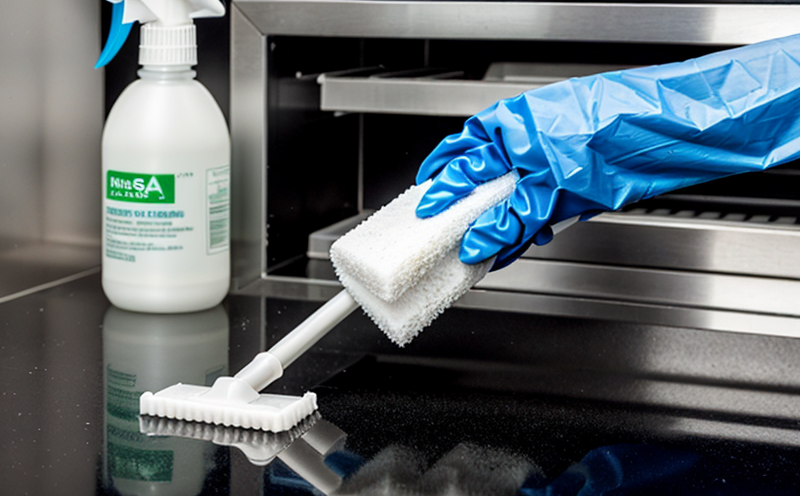ASTM E1174 Handwash Plastics Evaluation Testing
The ASTM E1174 standard provides a standardized method for evaluating the compatibility of handwash products with plastic materials commonly used in consumer and industrial applications. This test is particularly important for ensuring that cleaning agents do not degrade, discolor, or otherwise adversely affect plastics during use.
The primary focus of this testing is to determine whether the plastic materials used in items such as laundry detergents, dishwashing liquids, and other household cleaners will withstand the rigors of frequent handwashing without experiencing significant deterioration. The test is conducted over a specified number of wash cycles under controlled conditions that simulate real-world use.
Understanding the compatibility between cleaning agents and plastic materials is crucial for manufacturers to ensure product longevity and safety. Incompatibility can lead to potential health hazards, such as leaching of harmful chemicals into food or water, which could pose serious risks to users.
The methodology involves exposing plastic samples to a series of handwashing cycles using a specified detergent solution. The test is designed to replicate the conditions under which consumers typically use these cleaning agents. After each cycle, the samples are inspected for any signs of degradation such as discoloration, embrittlement, or loss of physical properties.
The ASTM E1174 standard specifies detailed procedures for the preparation of both the plastic specimens and the handwash solutions used in the testing process. This ensures that all participants follow consistent protocols, which is vital for obtaining accurate and comparable results. The test cycle typically involves a set number of washes, followed by visual inspection and measurement of any changes observed.
For quality managers and compliance officers, this service offers critical insights into the safety and durability of plastic components used in various products. R&D engineers can leverage these test results to refine their product designs, ensuring that new materials are compatible with common cleaning agents. Similarly, procurement teams can use this information to select suppliers who meet stringent compatibility standards.
The ASTM E1174 testing process is not just about compliance; it’s a proactive measure for enhancing the quality and safety of products on the market. By adhering to this standard, manufacturers can demonstrate their commitment to consumer safety and satisfaction.
Scope and Methodology
| Test Parameter | Description |
|---|---|
| Plastic Samples | Standardized polyethylene, polypropylene, polystyrene, and other common plastic types used in consumer products. |
| Detergent Solution | ASTM-recommended handwash product with known chemical composition. |
| Test Cycles | A specified number of wash cycles to simulate real-world use conditions. |
| Inspection Criteria | Visual and physical measurement of changes in color, texture, or other properties. |
| Data Collection | Comprehensive report detailing test parameters, results, and recommendations. |
The ASTM E1174 test is a rigorous process that ensures the compatibility of plastic materials with handwash products. By following these standardized procedures, laboratories like Eurolab can provide reliable, replicable data that helps manufacturers make informed decisions about their product designs.
Industry Applications
The ASTM E1174 handwash plastics evaluation testing is applicable across various industries where plastic materials come into frequent contact with cleaning agents. This includes the household goods sector, where products like detergents and dishwashing liquids are used daily. In the medical industry, ensuring that plastic components in medical equipment do not degrade under regular sterilization processes is critical.
The testing process also benefits the automotive industry, as many vehicles incorporate plastics for parts such as dashboards, steering wheels, and door handles. Ensuring these materials can withstand harsh cleaning agents without compromising safety or performance is a priority. In construction and infrastructure applications, where plastic components are exposed to various chemicals during maintenance, this test ensures longevity and reliability.
For R&D engineers, the ASTM E1174 testing provides valuable data that informs product development cycles. By identifying potential compatibility issues early in the design process, manufacturers can avoid costly recalls or product failures later on. This not only protects consumer safety but also enhances brand reputation and trust.
Eurolab Advantages
At Eurolab, our commitment to excellence in testing is reflected in the comprehensive approach we take with ASTM E1174 handwash plastics evaluation testing. Our state-of-the-art facilities and experienced technicians ensure that every test meets or exceeds industry standards.
We employ rigorous quality control measures throughout the testing process, from sample preparation to final analysis. Our use of advanced instrumentation allows for precise measurement and documentation of any changes observed in plastic specimens. This ensures that our clients receive accurate, reliable data that they can trust.
Eurolab’s expertise extends beyond just conducting tests; we also offer consultation services to help manufacturers identify potential issues early on. By leveraging our deep industry knowledge, we can provide recommendations for improving product design and ensuring compliance with relevant standards.
Our global network of laboratories allows us to serve clients in various regions, providing localized testing solutions that meet specific regulatory requirements. This flexibility ensures that our clients have access to the most accurate data possible, regardless of their geographic location.





